De Nederlandse dichter Ed Leeflang werd geboren op 21 juni 1929 in Amsterdam. Zie ook alle tags voor Ed Leeflang op dit blog.
De driesteenstrandloper
De zee kan het niet helpen,
in weeën komt haar drift;
voor haar opwelling wijkt hij,
haar bedenking beent hij na.
Van zijn bestaan verschijnt
het vluchtig spijkerschrift,
in scheve aanloopregels,
bijna kwatrijnen.
En door haar plompverloren dweilen
worden zij weggewist.
Ieder spoor van zijn gedribbel
moet verdwijnen, of hij zich in
de drang om voort te leven
zonder nadruk had vergist.
Blauw
Met kalmte van een nuttig mens
keek ik naar wolken en vertrapte haast
de stralend blauwe pol, de ereprijs
waar je die niet vermoedt, tegen
het stenen trapje aan de voet
van een nog kale winderige dijk.
Ik mocht je zo, de zin
die ik aan mijn verleden geef
hangt af van energie en van
toevalligs dat ik zie.
En daar grijpt midden op de dag
een blauw mij aan, als wij het niet
meer kunnen vinden, in een late schrik.
Ik had het vroeger voor je moeten stelen,
tegen je wil, tot elke prijs, ergens vandaan.
Magische bescherming
Spijker op je voordeur het bleke
houten masker tegen het kwaad.
De giftige blikken staren
dood en verderf tegemoet.
Al wat het op je voorzien heeft
draait zich om en druipt af
de holle ogen dwingen.
Slaap in en geloof dat ze
elk onheil buiten sluiten.
Dan is het zover en kom je
je eigen huis niet meer binnen.
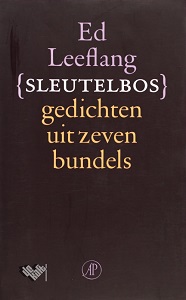
Ed Leeflang (21 juni 1929 – 17 maart 2008)
De Vlaamse dichter, schrijver en journalist Thomas Blondeau werd geboren in Poperinge op 21 juni 1978. Zie ook Zie ook alle tags voor Thomas Blondeau op dit blog.
heeft zich ooit een wereld tegen de mijne zo uitgesproken
heeft zich ooit een wereld tegen de mijne zo uitgesproken
als die van jou van hebben we elkaar teruggevonden in
brood in gekauwde handen dat is iets wat je gedraag je
deed je hief jezelf op aalladders naar me toe bedankte
me juichte toen ik zeeziek je schoenen volzeek
met de achterkant van de woorden hebben we
alles weggeschraapt we danken elkaar met volle
mond in deze contreien maken vlekken weten
verduiveld goed waarom we de dichter afschieten
wat we gaan doen vanavond het zal weinig van
onze tijd vergen maar het blijft ons kus bij kogelgat na
onderwijl kunnen we het nog eens hebben over je
over je homunculus een mond grind het schertsen
van het mes grrrr vooruit een tank vol steek
een vlaggenmast in het gat, zet een gek op het dak
en laat hem orgel spelen de pijpen knekels van de
dichter en we natuurlijk niet te vergeten het mirakel
van de stenen bril het boek en drie letters liefde
IV
we hebben gelogen om bij elkaar te zijn
dat draagt niet ver deze dagen dit zal dan
geen muur meer zijn geen contrapunt geen bed
ik ben nog jong bedden zijn om over op te
scheppen niet om te slapen te scheiden
vrienden verloren om bij elkaar te zijn
en dat allemaal zonder cirkels in het zand
handschoenen in het gezicht een godbetert
voorhangsel die brokaten druppels bloei – hou maar op
vraag me belachelijk te zijn ik zal manmoedig
op tafel staan een voet in de soepkom en zwaaien
met een heilig vuil servet
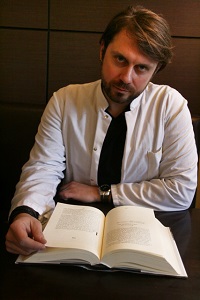
Thomas Blondeau (21 juni 1978 – 20 oktober 2013)
De Canadese dichteres, essayiste en vertaalster Anne Carson werd geboren op 21 juni 1950 in Toronto. Zie ook alle tags voor Anne Carson op dit blog.
Short Talk On Chromo-luminarism
Sunlight slows down Europeans. Look at all those
spellbound people in Seurat. Look at Monsieur,
sitting deeply. Where does a European go when he
is ‘lost in thought’? Seurat has painted that
place—the old dazzler! It lies on the other
side of attention, a long lazy boatride from here.
It is A Sunday rather than A Saturday afternoon
there. Seurat has made this clear by a special
method. “Ma méthode,” he called it, rather testily,
when we asked him. He caught us hurrying through
the chill green shadows like adulterers. The
river was opening and closing its stone lips.
The river was pressing Seurat to its lips.
Short Talk on Geisha
The question of geisha and sex has always been complex.
Some do, some don’t. In fact, as you know, the first
geisha were men (jesters and drummers). Their risky
patter made the guests laugh. But by 1780 “geisha”
meant woman and the glamorous business of the tea
houses had been brought under government control.
Some geisha were artists and called themselves
“white”. Others with nicknames like “cat” and
“tumbler” set up shacks every night on the wide
river bed, to vanish by dawn. The important
thing was, someone to yearn for. Whether the
quilt was long, or the night was too long, or
you were given this place to sleep or that
place to sleep, someone to wait for until
she is coming along and the grass is stirring,
a tomato in her palm.
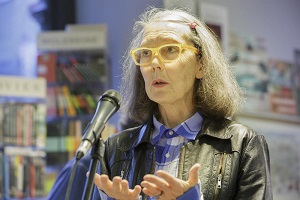
Anne Carson (Toronto, 21 juni 1950)
De Poolse dichter en essayist Adam Zagajewski werd geboren op 21 juni 1945 in Lwów, het huidige Lviv. Zie ook alle tags voor Adam Zagajewski op dit blog.
En Route
1. without baggage
To travel without baggage, sleep in the train
on a hard wooden bench,
forget your native land,
emerge from small stations
when a gray sky rises
and fishing boats head to sea.
2. in belgium
It was drizzling in Belgium
and the river wound between hills.
I thought, I’m so imperfect.
The trees sat in the meadows
like priests in green cassocks.
October was hiding in the weeds.
No, ma’am, I said,
this is the nontalking compartment.
3. a hawk circles above the highway
It will be disappointed if it swoops down
on sheet iron, on gas,
on a tape of tawdry music,
on our narrow hearts.
4. mont blanc
It shines from afar, white and cautious,
like a lantern for shadows.
5. segesta
On the meadow a vast temple—
a wild animal
open to the sky.
Vertaald door Clare Cavanagh
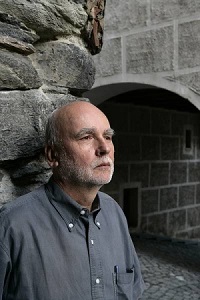
Adam Zagajewski (Lwów, 21 juni 1945)
De Britse schrijver Ian McEwan werd op 21 juni 1948 geboren in de Engelse garnizoensplaats Aldershot. Zie ook alle tags voor Ian McEwan op dit blog.
Uit: Amsterdam
“I suppose so.”
But instead they took another turn about the lawn, for they were there, after all, to bury Molly.
With a visible effort of concentration, Vernon resisted the anxieties of his office. “She was a lovely girl. Remember the snooker table?”
In 1978 a group of friends rented a large house in Scotland for Christmas. Molly and the man she was going about with at the time, a QC named Brady, staged an Adam and Eve tableau on a disused snooker table, he in his Y-fronts, she in bra and panties, a cue rest for a snake and a red ball for an apple. The story handed down, however, the one that had appeared in an obituary and was remembered that way even by some who were present, was that Molly “danced naked on Christmas Eve on a snooker table in a Scottish castle.”
“A lovely girl,” Clive repeated.
She had looked right at him when she pretended to bite the apple, and smiled raunchily through her chomping, with one hand on a jutting hip, like a music hall parody of a tart. He thought it was a signal, the way she held his gaze, and sure enough, they were back together that April. She moved into the studio in South Kensington and stayed through the summer. This was about the time her restaurant column was taking off, when she went on television to denounce the Michelin guide as the “kitsch of cuisine.” It was also the time of his own first break, the Orchestral Variations at the Festival Hall. Second time round. She probably hadn’t changed, but he had. Ten years on, he’d learned enough to let her teach him something. He’d always been of the hammer-and-tongs school. She taught him sexual stealth, the occasional necessity of stillness. Lie still, like this, look at me, really look at me. We’re a time bomb. He was almost thirty, by today’s standards a late developer. When she found a place of her own and packed her bags, he asked her to marry him. She kissed him, and quoted in his ear, He married a woman to stop her getting away/Now she’s there all day. She was right, for when she went he was happier than ever to be alone and wrote the Three Autumn Songs in less than a month.”
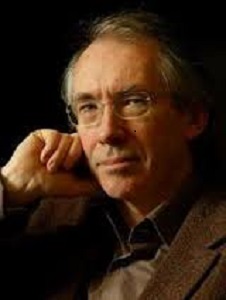
Ian McEwan (Aldershot, 21 juni 1948)
De Israëlische schrijver Alon Hilu werd geboren op 21 juni 1972 in Jaffa. Zie ook alle tags voor Alon Hilu op dit blog.
Uit: Death of a Monk
“My happy friend, while I impart these words to you, and as you record them from my mouth with your industrious fingers and with expression in your large brown eyes, I would ask your indulgence in reviving for a few moments the former, innocent image of Aslan, the image of a hollow-cheeked youth whose days were as roses, plagued by persecution at the hands of members of his household; still, it is incumbent upon you to recall that his excessive wickedness is yet to come, and that you must not be bound to him by bonds of love, and further, you must establish no hard and fast hatred for his enemies, rather, take extreme caution to avoid his infectious, burgeoning wickedness.
Let us return to memories of my father in young Aslan’s eyes, who is steeped in senseless hatred. Indeed, when Father’s shoutful voice arose from one of the rooms during one of his frequent disputes with Maman – the two would quarrel nearly every evening, after I had been given my lashing, about matters of great importance, such as why it was that his turban was once again stained and dirty, and why there was insufficient water in his narghile, and why once again the septic pit at the edge of the fruit orchards was filling the air with a putrid odor – when their voices rose and overwhelmed me, I would return there, to the date palms with their succulent fruits, a pure and cloudless desert day, and the sound of hooves reaches my ears and I am riding a wild stallion, tall leather boots on my feet and a sickle-shaped sword brandished in my hand, my arms no longer thin and spotted, but thick, firm, hardened, and my legs are no longer blighted and evil, they sport the light calves of experienced riders, and they push into the ribs of the horse and cause him to gallop and increase his speed, and my eyes do not covetously drink in all the beauty and grandeur of the world; instead they are generous and pure and appreciative, and I ride there, bare-chested and bronzed, exposed to the sun, my trusted ally.”
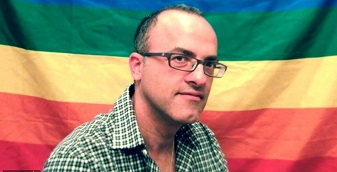
Alon Hilu (Jaffa, 21 juni 1972)
De Franse schrijver Jean Paul Sartre werd geboren op 21 juni 1905 in Parijs. Zie ook alle tags voor Jean-Paul Sartre op dit blog.
Uit: Nausea (Vertaald door Robert Baldick)
“What if something were to happen? What if something suddenly started throbbing? Then they would notice it was there and they’d think their hearts were going to burst. Then what good would their dykes, bulwarks, power houses, furnaces and pile drivers be to them? It can happen any time, perhaps right now: the omens are present. For example, the father of a family might go out for a walk, and, across the street, he’ll see something like a red rag, blown towards him by the wind. And when the rag has gotten close to him he’ll see that it is a side of rotten meat, grimy with dust, dragging itself along by crawling, skipping, a piece of writhing flesh rolling in the gutter, spasmodically shooting out spurts of blood. Or a mother might look at her child’s cheek and ask him: “What’s that, a pimple?” and see the flesh puff out a little, split, open, and at the bottom of the split an eye, a laughing eye might appear. Or they might feel things gently brushing against their bodies, like the caresses of reeds to swimmers in a river. And they will realize that their clothing has become living things. And someone else might feel something scratching in his mouth. He goes to the mirror, opens his mouth: and his tongue is an enormous, live centipede, rubbing its legs together and scraping his palate. He’d like to spit it out, but the centipede is a part of him and he will have to tear it out with his own hands. And a crowd of things will appear for which people will have to find new names, stone eye, great three cornered arm, toe crutch, spider jaw. And someone might be sleeping in his comfortable bed, in his quiet, warm room, and wake up naked on a bluish earth, in a forest of rustling birch trees, rising red and white towards the sky like the smokestacks of Jouxtebouville, with big bumps half way out of the ground, hairy and bulbous like onions. And birds will fly around these birch trees and pick at them with their beaks and make them bleed. Sperm will flow slowly, gently, from these wounds, sperm mixed with blood, warm and glassy with little bubbles.”
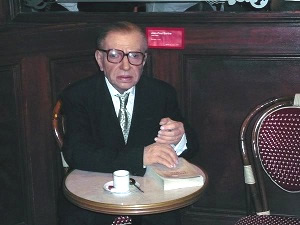
Jean-Paul Sartre (21 juni 1905 – 15 april 1980)
Sarte in het Musée Grévin (wassenbeelden), Parijs
Zie voor nog meer schrijvers van de 21e juni ook mijn drie blogs van 21 juni 2014.

1 thoughts on “Ed Leeflang, Thomas Blondeau, Anne Carson, Adam Zagajewski, Ian McEwan, Alon Hilu, Jean-Paul Sartre”
De commentaren zijn gesloten